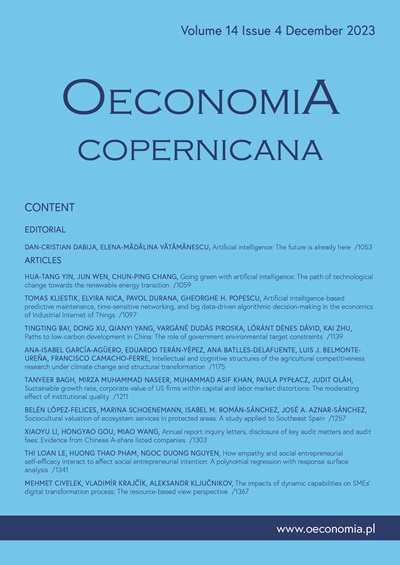The nonlinear relationship between financial flexibility and enterprise risk-taking during the COVID-19 pandemic in Taiwan?s semiconductor industry
IF 10.8
1区 经济学
Q1 ECONOMICS
引用次数: 15
Abstract
Research background: Risk-taking is the basis for sustainable development of enterprise. It was clear that the influence COVID-19 epidemic on the global market economy has increased operational risks for businesses. The semiconductor industry has high operating risks and financial risks. Moderate financial flexibility (FF) can improve the ability of semiconductor enterprises to acquire financial resources in real time, calmly cope with the impact of uncertainties in operation, improve investment opportunities, and enhance sustainable operation. It is therefore interesting to study the influence of FF on enterprise risk-taking (ERT). Purpose of the article: The aim of the contribution is to explore the effect of FF on ERT within Taiwan?s semiconductor industry amid the COVID-19 pandemic period, and investigate whether ERT varies with semiconductor industry characteristic. Methods: Data from first three quarters of 2020, from multinational semiconductor firms listed on the Taiwan Stock Exchange (TSE), were collected and analyzed. Fixed effects regression with heteroscedasticity adjustment used to evaluate the influence of FF on the ERT of Taiwan?s semiconductor industry. Furthermore, in order to corroborate and support the reliability of the results, this research also used the different measures of ERT and Quantile regression (median regression) in the research model to check the robustness. Findings & value added: Empirical results indicate that FF has a U-shaped effect on ERT for multinational semiconductor firms listed on the TSE, particularly within the integrated circuits (IC) manufacturing industry. Additionally, FF also has a U-shaped effect on ERT for the asset-light semiconductor and IC manufacturing industries. This article also suggests that for the asset-light semiconductor and IC manufacturing industries, the optimal inflection points are 1.1397 and 0.9729, respectively. Based on the consequences of this study, it is suggested that Taiwan?s semiconductor industry should reasonably maintain FF and focus on the liquidity risk management for the long term value added, even after the COVID-19 pandemic period.台湾新冠疫情期间财务弹性与企业风险承担的非线性关系?半导体产业
研究背景:风险承担是企业可持续发展的基础。显然,新冠肺炎疫情对全球市场经济的影响加大了企业的经营风险。半导体行业存在较高的经营风险和财务风险。适度的财务灵活性(FF)可以提高半导体企业实时获取财务资源的能力,从容应对经营不确定性的影响,改善投资机会,增强可持续经营。因此,研究FF对企业风险承担的影响具有重要意义。文章目的:本文的目的是探讨在新冠肺炎大流行期间,FF对台湾半导体行业ERT的影响,以及ERT是否随半导体行业特征而变化。方法:收集台湾证券交易所(TSE)上市跨国半导体公司2020年前三季度的数据并进行分析。采用异方差调整的固定效应回归,评估FF对台湾半导体产业ERT的影响。此外,为了证实和支持结果的可靠性,本研究还在研究模型中使用了ERT和分位数回归(中位数回归)的不同度量来检验稳健性。研究结果与增加值:实证结果表明,对于在东京证券交易所上市的跨国半导体公司,特别是集成电路(IC)制造业,FF对ERT具有u型影响。此外,对于轻资产半导体和集成电路制造行业,FF对ERT也有u型影响。对于轻资产半导体和集成电路制造行业,最优拐点分别为1.1397和0.9729。基于本研究的结果,建议台湾半导体产业即使在新冠肺炎大流行之后,也应合理维持FF,并注重长期增值的流动性风险管理。©2021尼古拉斯哥白尼大学。版权所有。
本文章由计算机程序翻译,如有差异,请以英文原文为准。
求助全文
约1分钟内获得全文
求助全文
来源期刊

Oeconomia Copernicana
ECONOMICS-
CiteScore
13.70
自引率
5.90%
发文量
26
审稿时长
24 weeks
期刊介绍:
The Oeconomia Copernicana is an academic quarterly journal aimed at academicians, economic policymakers, and students studying finance, accounting, management, and economics. It publishes academic articles on contemporary issues in economics, finance, banking, accounting, and management from various research perspectives. The journal's mission is to publish advanced theoretical and empirical research that contributes to the development of these disciplines and has practical relevance. The journal encourages the use of various research methods, including falsification of conventional understanding, theory building through inductive or qualitative research, first empirical testing of theories, meta-analysis with theoretical implications, constructive replication, and a combination of qualitative, quantitative, field, laboratory, and meta-analytic approaches. While the journal prioritizes comprehensive manuscripts that include methodological-based theoretical and empirical research with implications for policymaking, it also welcomes submissions focused solely on theory or methodology.
 求助内容:
求助内容: 应助结果提醒方式:
应助结果提醒方式:


